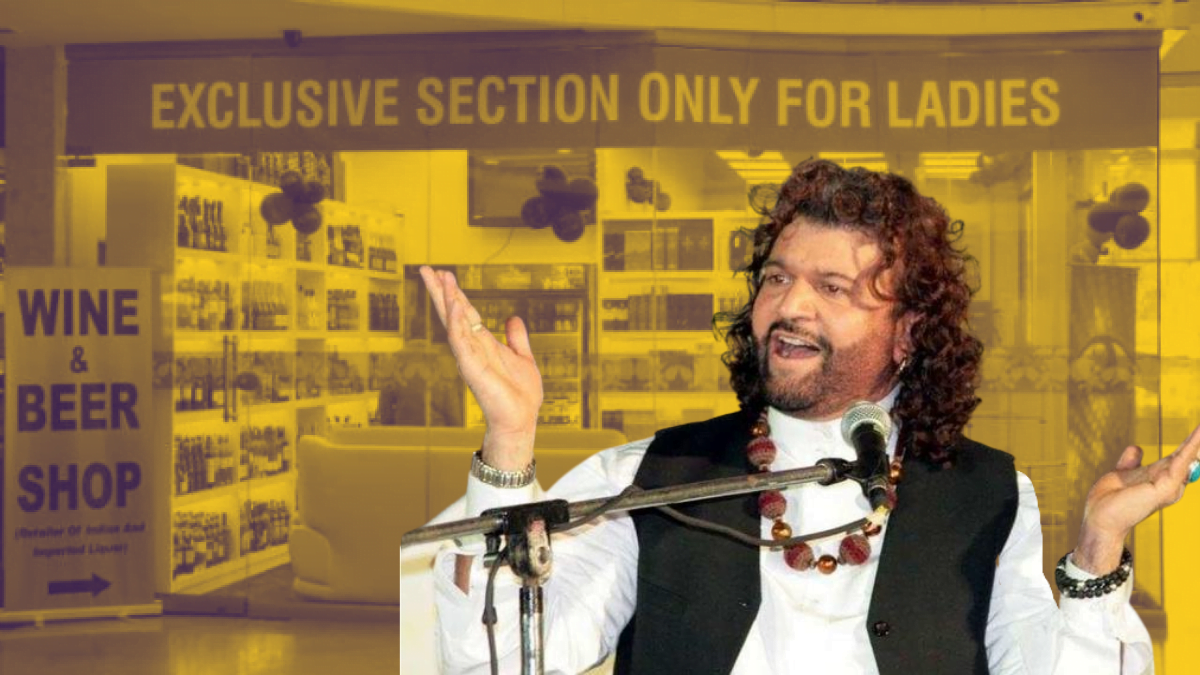“Earlier, a man would get drunk and ill-treat and abuse women. What will be the scene when the woman comes home drunk from these pink thekas. She will slap her husband twice-thrice,” BJP MP Hans Raj Hans had said in a press conference directed to attack the AAP government for their New Excise Policy. The policy change was announced in November last year when the ruling government expressed its concern over the middlemen in the liquor business. They decided to vend the liquor licenses themselves. According to the new policy, 849 new liquor licenses have been distributed in Delhi. Though the policy doesn’t mention inaugurating any dedicated liquor stores to women, it gives complete freedom to private players to open pink thekas.
The months preceding the elections are bound to experience political humdrum, but the systematic gendered contextualization of alcoholism unveils the lack of a feminist political discourse. Hans Raj Hans continued to make comments from a public stage like, “Will it be nice if women return home drunk? They will pass out on the streets and in the drains in Delhi. Please have mercy and stop”. While alcoholism is a social problem, making light of it in the context of women is insulting and deprecating for society. Any political statement cannot be devoid of context. It not only unveils but also constructs a public perception.
Also read: Is Our Approach To Alcoholism In Women Sexist?
Hans Raj Hans continued to make comments from a public stage like, “Will it be nice if women return home drunk? They will pass out on the streets and in the drains in Delhi. Please have mercy and stop”. While alcoholism is a social problem, making light of it in the context of women is insulting and deprecating for society. Any political statement cannot be devoid of context. It not only unveils but also constructs a public perception.
Pink ‘Thekas’
Delhi has a pink theka at Star City Mall in East Delhi. In 2015, the owner had an ingenious idea and sectioned off a part of his shop with a pink ribbon. He called it the Exclusive Section for Women. The section has clean shiny glass walls, stunning interiors, sophisticated seating arrangements, and an assortment of expensive alcohol bottles decorated on the counters. While the women might feel safer with the female security guard, a dedicated section, and a friendly sales representative, the idea of pink theka is only the construction of a utopia for women.
During the pandemic when the decision to lift curbs on liquor stores was announced, wine and beer shops in the city witnessed long queues. While the news made alcohol consumption fodder for the meme culture, the coming elections have turned it into a moral issue. The BJP MP on the stage evoked that alcohol was making the youth and women of the city morally corrupt, and to protect the future the thekas needed to be shut.
The opposition party in Delhi announced a referendum against the new excise policy and placed specially crafted boxes at 1,120 places across 280 civic wards on March 4. The result was a clear disdain towards the AAP government’s policy, said BJP Delhi President Adesh Gupta. Meanwhile the governing party reacted by stating that BJP didn’t want the middlemen and Alcohol Commission to go out of the system. Not many eyebrows were raised on how the BJP MP conveniently sidelined women’s agency in the process of moral policing their choice of alcohol consumption.
Domestic Abuse
In his comment, Hans was afraid that the drunk women would imitate their drunk and abusive husbands and slap them. He used the idea of domestic violence so casually that it almost normalized women being beaten by drunk husbands. What he evoked through his speech was the disbelief at the audacity of a woman trying to imitate her husband. His statement unveiled the hypocrisy of a culture that still is afraid of the reversal of gender roles.
Hans’ comments were directed at the moral corruption of a society where women would drink and slip in the alleys. While he could have tackled the entire issue from a socio-scientific perspective where drinking is injurious to health, he rather decided to make it all about women. Women have been the pallbearers of a society’s morality ever since its inception. They are expected to stay in virtual boundaries while the men could transgress. Alcohol consumption and smoking are the vices that have been sanctioned to men but are still frowned upon when a woman tries to ease her step.
The Ideal Bharatiya Nari
The woman in India has been constructed as the mother and the goddess. She is either worshipped or cast aside. The context of an Indian woman is always a binary of a goddess/witch, she cannot exist in between. She needs guardians, she is fragile, and she must be respected. She is expected to behave in a certain manner and any transgressions are not taken lightly.
The call for hailing the mother (Bande Mataram) in the fight for Independence constructed the mould in which an Indian man wants to see a woman. “Mother, hail!/ Thou with sweet springs flowing,/ Thou fair fruits bestowing,/ Cool with zephyrs blowing,/ Green with corn-crops growing,/ Mother, hail!” (Anandmath 127) She is dreamt of as a sweet spring, fair fruit, cool zephyr blowing, and always growing. How could a society that has been intoxicated with this imagery of a woman be expected to be comfortable with the idea of a woman drinking and enjoying herself?
The call for hailing the mother (Bande Mataram) in the fight for Independence constructed the mould in which an Indian man wants to see a woman. “Mother, hail!/ Thou with sweet springs flowing,/ Thou fair fruits bestowing,/ Cool with zephyrs blowing,/ Green with corn-crops growing,/ Mother, hail!” (Anandmath 127) She is dreamt of as a sweet spring, fair fruit, cool zephyr blowing, and always growing. How could a society that has been intoxicated with this imagery of a woman be expected to be comfortable with the idea of a woman drinking and enjoying herself?
The Gendered Associations With The Consumption Of Alcohol
Alcohol consumption is injurious to health. It affects all human bodies adversely, irrespective of the consumer’s gender. Still, every advertisement of alcohol is meant for the man. Woman, meanwhile, is posited as the gift that follows drinking such a masculine drink. The idea of a woman consuming alcohol is not well received, and the hypothetical picture of her misbehaving after consuming alcohol commands mockery.
Also Read: It Might Or Might Not Surprise You Where You Find Freedom
The Idea Of Shame And Alcohol
The comments by the BJP MP also brought into light a hidden psyche of the society we live in. The concern was always with respect to the men of the society. A drunk woman might hit her husband or bring shame by slipping in dark alleys. This concern, with its roots in a victim-blaming narrative, wonders how would the man adjust with a “loose woman”. Every act of a woman is critiqued with respect to its consequences on the men of society.
The minister’s comments evoke an idea of shame for the culture where women would drink. It is a comment that pushes men to be more aware of protecting their women and not letting them transgress. Women have been burdened with society’s idea of morality for very long. Alcoholism is a menace and drinking is a choice. This must be understood and tackled without gender prejudice, even politically.
The minister’s comments evoke an idea of shame for the culture where women would drink. It is a comment that pushes men to be more aware of protecting their women and not letting them transgress. Women have been burdened with society’s idea of morality for very long. Alcoholism is a menace and drinking is a choice. This must be understood and tackled without gender prejudice, even politically.
Citations
Chatterji, Bankim Chabdra. Anandmath. Library of South Asian Literature, 1992.
Featured image source: YouTube
About the author(s)
Dr. Guni Vats is an Assistant Professor at the Department of English, Manav Rachna International Institute of Research and Studies. A PhD in Gender Studies, she is a renowned researcher, writer, and scholar.





